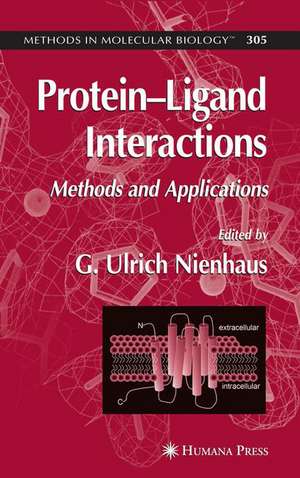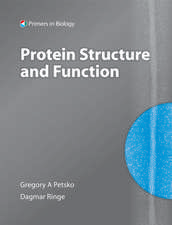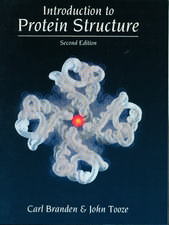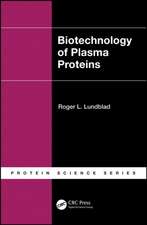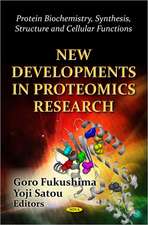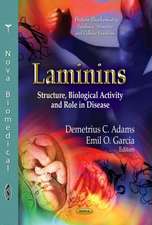Protein'Ligand Interactions: Methods and Applications: Methods in Molecular Biology, cartea 305
Editat de G. Ulrich Nienhausen Limba Engleză Hardback – 21 mar 2005
| Toate formatele și edițiile | Preț | Express |
|---|---|---|
| Paperback (1) | 1223.70 lei 6-8 săpt. | |
| Humana Press Inc. – 19 noi 2010 | 1223.70 lei 6-8 săpt. | |
| Hardback (1) | 1238.56 lei 6-8 săpt. | |
| Humana Press Inc. – 21 mar 2005 | 1238.56 lei 6-8 săpt. |
Din seria Methods in Molecular Biology
- 9%
 Preț: 791.59 lei
Preț: 791.59 lei - 23%
 Preț: 598.56 lei
Preț: 598.56 lei - 20%
 Preț: 882.95 lei
Preț: 882.95 lei -
 Preț: 252.04 lei
Preț: 252.04 lei - 5%
 Preț: 802.69 lei
Preț: 802.69 lei - 5%
 Preț: 729.61 lei
Preț: 729.61 lei - 5%
 Preț: 731.43 lei
Preț: 731.43 lei - 5%
 Preț: 741.30 lei
Preț: 741.30 lei - 5%
 Preț: 747.16 lei
Preț: 747.16 lei - 15%
 Preț: 663.45 lei
Preț: 663.45 lei - 18%
 Preț: 1025.34 lei
Preț: 1025.34 lei - 5%
 Preț: 734.57 lei
Preț: 734.57 lei - 18%
 Preț: 914.20 lei
Preț: 914.20 lei - 15%
 Preț: 664.61 lei
Preț: 664.61 lei - 15%
 Preț: 654.12 lei
Preț: 654.12 lei - 18%
 Preț: 1414.74 lei
Preț: 1414.74 lei - 5%
 Preț: 742.60 lei
Preț: 742.60 lei - 20%
 Preț: 821.63 lei
Preț: 821.63 lei - 18%
 Preț: 972.30 lei
Preț: 972.30 lei - 15%
 Preț: 660.49 lei
Preț: 660.49 lei - 5%
 Preț: 738.41 lei
Preț: 738.41 lei - 18%
 Preț: 984.92 lei
Preț: 984.92 lei - 5%
 Preț: 733.29 lei
Preț: 733.29 lei -
 Preț: 392.58 lei
Preț: 392.58 lei - 5%
 Preț: 746.26 lei
Preț: 746.26 lei - 18%
 Preț: 962.66 lei
Preț: 962.66 lei - 23%
 Preț: 860.21 lei
Preț: 860.21 lei - 15%
 Preț: 652.64 lei
Preț: 652.64 lei - 5%
 Preț: 1055.50 lei
Preț: 1055.50 lei - 23%
 Preț: 883.85 lei
Preț: 883.85 lei - 19%
 Preț: 491.88 lei
Preț: 491.88 lei - 5%
 Preț: 1038.84 lei
Preț: 1038.84 lei - 5%
 Preț: 524.15 lei
Preț: 524.15 lei - 18%
 Preț: 2122.34 lei
Preț: 2122.34 lei - 5%
 Preț: 1299.23 lei
Preț: 1299.23 lei - 5%
 Preț: 1339.10 lei
Preț: 1339.10 lei - 18%
 Preț: 1390.26 lei
Preț: 1390.26 lei - 18%
 Preț: 1395.63 lei
Preț: 1395.63 lei - 18%
 Preț: 1129.65 lei
Preț: 1129.65 lei - 18%
 Preț: 1408.26 lei
Preț: 1408.26 lei - 18%
 Preț: 1124.92 lei
Preț: 1124.92 lei - 18%
 Preț: 966.27 lei
Preț: 966.27 lei - 5%
 Preț: 1299.99 lei
Preț: 1299.99 lei - 5%
 Preț: 1108.51 lei
Preț: 1108.51 lei - 5%
 Preț: 983.72 lei
Preț: 983.72 lei - 5%
 Preț: 728.16 lei
Preț: 728.16 lei - 18%
 Preț: 1118.62 lei
Preț: 1118.62 lei - 18%
 Preț: 955.25 lei
Preț: 955.25 lei - 5%
 Preț: 1035.60 lei
Preț: 1035.60 lei - 18%
 Preț: 1400.35 lei
Preț: 1400.35 lei
Preț: 1238.56 lei
Preț vechi: 1510.44 lei
-18% Nou
Puncte Express: 1858
Preț estimativ în valută:
236.99€ • 247.44$ • 196.15£
236.99€ • 247.44$ • 196.15£
Carte tipărită la comandă
Livrare economică 04-18 aprilie
Preluare comenzi: 021 569.72.76
Specificații
ISBN-13: 9781588293725
ISBN-10: 1588293726
Pagini: 584
Ilustrații: XI, 568 p.
Dimensiuni: 155 x 235 x 41 mm
Greutate: 1.04 kg
Ediția:2005
Editura: Humana Press Inc.
Colecția Humana
Seria Methods in Molecular Biology
Locul publicării:Totowa, NJ, United States
ISBN-10: 1588293726
Pagini: 584
Ilustrații: XI, 568 p.
Dimensiuni: 155 x 235 x 41 mm
Greutate: 1.04 kg
Ediția:2005
Editura: Humana Press Inc.
Colecția Humana
Seria Methods in Molecular Biology
Locul publicării:Totowa, NJ, United States
Public țintă
ResearchCuprins
Isothermal Titration Calorimetry.- Direct Optical Detection of Protein-Ligand Interactions.- Label-Free Detection of Protein-Ligand Interactions by the Quartz Crystal Microbalance.- Measurement of Solvent Accessibility at Protein-Protein Interfaces.- Hydrophobic Interaction Chromatography.- Sedimentation Velocity Method in the Analytical Ultracentrifuge for the Study of Protein-Protein Interactions.- Protein-Ligand Interaction Probed by Time-Resolved Crystallography.- X-Ray Crystallography of Protein-Ligand Interactions.- Combined Use of XAFS and Crystallography for Studying Protein-Ligand Interactions in Metalloproteins.- NMR Studies of Protein-Ligand Interactions.- Probing Heme Protein-Ligand Interactions by UV/Visible Absorption Spectroscopy.- Ultrafast Time-Resolved IR Studies of Protein-Ligand Interactions.- Monitoring Protein-Ligand Interactions by Time-Resolved FTIR Difference Spectroscopy.- Proteins in Motion.- Fluorescence Polarization/Anisotropy Approaches to Study Protein-Ligand Interactions.- Ligand Binding With Stopped-Flow Rapid Mixing.- Circular Dichroism Spectroscopy for the Study of Protein-Ligand Interactions.- High-Throughput Screening of Interactions Between G ProteinCoupled Receptors and Ligands Using Confocal Optics Microscopy.- Single-Molecule Study of Protein-Protein and Protein-DNA Interaction Dynamics.- Application of Fluorescence Correlation Spectroscopy to Hapten-Antibody Binding.- Atomic Force Microscopy Measurements of Protein-Ligand Interactions on Living Cells.- Computer Simulation of Protein-Ligand Interactions.- Force Probe Molecular Dynamics Simulations.- Study of Ligand-Protein Interactions by Means of Density Functional Theory and First-Principles Molecular Dynamics.
Textul de pe ultima copertă
Molecular recognition and binding of ligands (atoms, ions, and molecules) by proteins with high sensitivity and selectivity is of central importance to essentially all biomolecular processes and of key importance for the basic and applied sciences. In Protein-Ligand Interactions: Methods and Applications, leading experts with hands-on experience describe in detail a broad selection of established and emerging techniques for studying the interaction between proteins and ligands, including bulk biochemical techniques, structure analysis, spectroscopy, single-molecule studies, and theoretical/computational tools. Among the highlights are surface plasmon resonance (SPR) and reflectometric biosensor approaches, high-throughput screening with confocal optics microscopy, single molecule fluorescence and fluorescence correlation spectroscopy (FCS), atomic force microscopy (AFM), crystallography of reaction intermediates, and time-resolved X-ray crystallography. The protocols follow the successful Methods in Molecular Biology™ series format, each offering step-by-step laboratory instructions, an introduction outlining the principle behind the technique, lists of the necessary equipment and reagents, and tips on troubleshooting and avoiding known pitfalls.
Cutting-edge and highly practical, Protein-Ligand Interactions: Methods and Applications offers novice and expert researchers alike a broad selection of powerful and widely applicable techniques that can be used to efficiently and successfully solve the task of characterizing protein-ligand interactions.
Cutting-edge and highly practical, Protein-Ligand Interactions: Methods and Applications offers novice and expert researchers alike a broad selection of powerful and widely applicable techniques that can be used to efficiently and successfully solve the task of characterizing protein-ligand interactions.
Caracteristici
Includes supplementary material: sn.pub/extras
